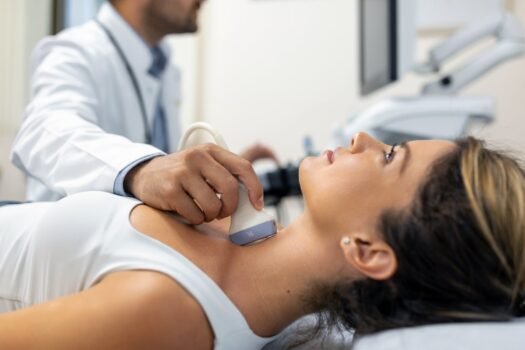Thyroid Disease Explained
What is Thyroid Disease?
Thyroid disease encompasses a range of conditions affecting the thyroid gland, a butterfly-shaped organ in the neck responsible for producing hormones that regulate metabolism, energy, and growth. Imbalances in these hormones can lead to significant health issues.
Classify Thyroid Disease
Condition: Thyroid disease is classified as an endocrine disorder that impacts the production and regulation of hormones.
Thyroid Disease Statistics
Thyroid disease affects approximately 20 million Americans, with women being five to eight times more likely to develop it than men. Globally, iodine deficiency and autoimmune disorders contribute significantly to its prevalence.
Types of Thyroid Disease
- Hypothyroidism: Underactive thyroid; insufficient hormone production.
- Hyperthyroidism: Overactive thyroid; excess hormone production.
- Goiter: Enlargement of the thyroid gland.
- Thyroid Nodules: Lumps in the thyroid, which may be benign or cancerous.
- Thyroid Cancer: Malignant growths in the thyroid.
- Hashimoto’s Thyroiditis: Autoimmune cause of hypothyroidism.
- Graves’ Disease: Autoimmune cause of hyperthyroidism.
Health Signs and Symptoms
Early Detection: Pay attention to energy levels, weight changes, and swelling in the neck.
Common Signs and Symptoms:
- Fatigue or restlessness.
- Weight gain (hypothyroidism) or loss (hyperthyroidism).
- Swollen neck (goiter).
- Sensitivity to cold or heat.
- Hair thinning or brittle hair.
- Irregular heartbeat.
- Difficulty concentrating (brain fog).
- Depression or anxiety.
Anatomy and Physiology
The thyroid gland, located in the neck, is part of the endocrine system.
- Thyroxine (T4) and Triiodothyronine (T3) are the primary hormones.
- Pituitary Gland regulates thyroid function via Thyroid Stimulating Hormone (TSH).
Causes
Brief Description: Thyroid disease results from autoimmune conditions, dietary deficiencies, or environmental factors.
Common Causes:
- Iodine Deficiency: Essential for hormone production.
- Autoimmune Disorders: Hashimoto’s or Graves’ disease.
- Genetic Predisposition: Family history of thyroid issues.
- Radiation Exposure: Affects thyroid tissue.
- Medications: Lithium and other drugs can disrupt thyroid function.
Thyroid Disease Stages
- Initial Stage: Mild symptoms, often undetected.
- Moderate Stage: Noticeable changes in weight, energy, and neck appearance.
- Advanced Stage: Severe symptoms, potential complications (e.g., heart disease or infertility).
Prevention
- Maintain a balanced diet rich in iodine and selenium.
- Avoid excessive radiation exposure.
- Regular check-ups if there is a family history.
- Manage stress to reduce autoimmune flare-ups.
Thyroid Disease Diagnosis
Diagnosis typically includes a combination of physical examination, blood tests, and imaging to evaluate thyroid function and structure.
Tests & Examinations
- Blood Tests: TSH, T3, T4, and thyroid antibody levels.
- Ultrasound: Detects nodules or enlargement.
- Thyroid Scan: Assesses gland activity.
- Fine-Needle Aspiration Biopsy: Determines if nodules are cancerous.
Health Professionals
- Endocrinologists: Specialists in hormone-related conditions.
- Primary Care Practitioners: For initial evaluation and referrals.
- Surgeons: For thyroidectomy if needed.
- Oncologists: For thyroid cancer management.
Reasons to See a Professional
- Persistent fatigue, unexplained weight changes, or neck swelling.
- Symptoms of hyperthyroidism or hypothyroidism.
- Family history of thyroid disorders.
Process to Find the Right Professional
- Request referrals from your primary care physician.
- Verify credentials and specialization in thyroid disorders.
- Seek care from accredited endocrine or cancer centers.
Visit Preparation
- Keep a symptom diary.
- Bring a list of medications and supplements.
- Prepare questions about potential treatments.
Questions to Ask
- What type of thyroid disease do I have?
- What is the cause of my condition?
- What are my treatment options?
- What lifestyle changes should I make?
- How often should I monitor my thyroid function?
Diagnosis
Diagnosis involves evaluating symptoms, blood test results, imaging, and sometimes biopsy to confirm the specific thyroid condition.
Procedures
- Thyroid Function Tests: Blood tests for TSH, T3, T4.
- Ultrasound: For structural evaluation.
- Biopsy: If cancer is suspected.
Treatments
- Medications: Hormone replacement therapy (e.g., levothyroxine) for hypothyroidism or antithyroid drugs for hyperthyroidism.
- Radioactive Iodine: To shrink the thyroid in hyperthyroidism.
- Surgery: For nodules, goiter, or cancer.
- Lifestyle Management: Diet and exercise changes.
Health Monitoring
- Regular blood tests to monitor hormone levels.
- Thyroid ultrasounds for structural changes.
- Home devices to track symptoms like weight and heart rate.
How to Manage Thyroid Disease
- Follow prescribed medication schedules.
- Regularly consult with your healthcare provider.
- Adopt a thyroid-friendly diet.
Nutrition Dos and Don’ts
Dos:
- Eat iodine-rich foods (e.g., seafood, iodized salt).
- Include selenium (e.g., Brazil nuts) and zinc (e.g., pumpkin seeds).
Don’ts:
- Avoid excessive soy and cruciferous vegetables (raw).
- Limit processed and high-sugar foods.
Lifestyle Dos and Don’ts
Dos:
- Practice stress management techniques.
- Exercise regularly but avoid overexertion.
Don’ts:
- Do not skip medications.
- Avoid smoking, which can exacerbate thyroid issues.
Emergency Situations
- Thyroid Storm: A life-threatening hyperthyroidism complication; symptoms include fever, rapid heart rate, and confusion.
- Myxedema Coma: Severe hypothyroidism; symptoms include extreme fatigue and hypothermia.
What to Do: Seek immediate emergency care.
Prognosis
With proper management, most thyroid diseases can be controlled effectively, allowing individuals to lead healthy lives. Prognosis varies for thyroid cancer based on stage and type.
Clinical Products
- Levothyroxine: For hypothyroidism treatment.
- Propylthiouracil or Methimazole: For hyperthyroidism treatment.
- Iodine Supplements: For iodine-deficient individuals.
- Thyroid Support Monitors: Devices to track weight and heart rate.
- Nutritional Supplements: Selenium or zinc for thyroid health.
Services
- Endocrinology Clinics: Specialized thyroid care.
- Telemedicine: Remote consultations for thyroid management.
- Thyroid Cancer Support Groups: Emotional support and resources.
- Dietitian Services: Nutrition counseling for thyroid health.
- Insurance Coverage: Ensure thyroid treatment is included.
Frequently Asked Questions
- What causes thyroid disease? Autoimmune conditions, iodine deficiency, or genetics.
- Can thyroid disease be cured? Many forms can be managed but not cured.
- Is thyroid cancer fatal? Most types have high survival rates if detected early.
- What is hypothyroidism? A condition where the thyroid produces too little hormone.
- How is thyroid disease diagnosed? Blood tests, imaging, and sometimes biopsy.
- Can I live without a thyroid? Yes, with hormone replacement therapy.
- What foods affect thyroid health? Iodine-rich foods help, but avoid excess soy or raw cruciferous vegetables.
- What are thyroid nodules? Lumps in the thyroid; most are benign.
- How often should I check my thyroid? At least annually or as recommended.
- Can stress cause thyroid disease? Stress can exacerbate autoimmune thyroid conditions.





